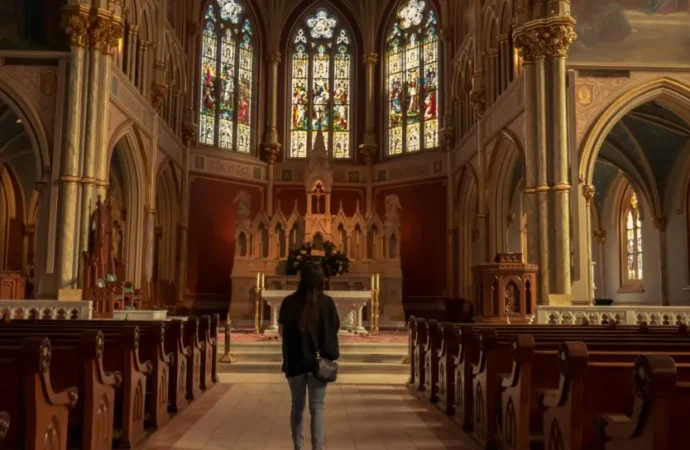“[L]et us consider how to stir up one another to love and good works, not neglecting to meet together, as is the habit of some, but encouraging one another, and all the more as you see the Day drawing near.” – Hebrews 10:24-25
Want to live a longer, healthier, and more upbeat life?
Doctors, researchers, and other experts have long promoted all sorts of remedies against aging, ill health, and depression. Take your vitamins, avoid certain foods, watch your weight, exercise, and get enough sleep are some of their basic recommendations for good health.
But it turns out that the best preventative medicine doesn’t come in a bottle, a gym, or a cookbook. It comes inside a church.
In his excellent article, “Church Attendance is No Longer Optional,” John Mac Ghlionn cites data demonstrating that “weekly churchgoers are significantly happier, less likely to suffer depression, and far less likely to die young.” He then addresses those Christians who avoid church, who take their religion from podcasts on their living room sofas rather than sitting in a pew. “Faith,” he observes, “was never meant to be private hygiene — it’s communal health,” and it can extend a person’s lifespan by as much as seven years.
As Mac Ghlionn rightly observes, people find all sorts of reasons for avoiding church, like bad sermons, second-rate music, and hypocritical ministers or congregants. Several Christians I know regard church as unnecessary, believing it’s enough to read their Bibles and pray. Some judge churchgoers and find them wanting in one virtue or another, forgetting that churches are for sinners as much as saints. Others of my acquaintance never give church attendance a thought, though they would likely say they were Christians if pressed.
If we read Mac Ghlionn’s article, and the research he cites, and then search online for answers to “Does going to church help you live longer?” we find common-sense reasons why this question can be answered in the affirmative. For one, church is a community. Especially in our age, when so many Americans feel lonely or look to their phones for friendship rather than face-to-face encounters, a church offers fellowship in the flesh. It provides an antidote to today’s poisonous combination of isolation and narcissism.
Moreover, the message delivered by so many churches – hope, love of neighbor, forgiveness, virtue – can be both healing and transformative. In her 2018 article, “You Asked: Do Religious People Live Longer?” Time Magazine health correspondent Jamie Ducharme examines the same Harvard study used by Mac Ghlionn and notes that traditional faith values like respect, compassion, and gratitude impact our physical and mental well-being.
These secular researchers understandably tread with care around the place of a higher power in their conclusions. Yet as Christians know, God is found not only in Scripture or in church doctrines, but in other human beings. Sitting in those pews are all sorts of people, the goodhearted and the brokenhearted, the humble and the proud, those trying to find the Way and those who have lost their way.
Consequently, church becomes a polishing machine, a tool with your fellow worshippers serving as abrasives and soft pads to correct imperfections and make your soul smoother and shinier. As Mac Ghlionn writes, “The Church, for all its flaws, remains humanity’s oldest recovery group. It’s where addicts confess, doubters find faith, and cynics find peace. In its best moments, it is heaven rehearsed — ordinary people practicing eternity.” Read the Book of Acts or the letters of Paul, and you’ll see right away that this spectrum of virtues and vices is nothing new.
Here are two examples from my own experience.
At a daily Mass I attended about two years ago, one of our priests delivered a homily I’ll remember word for word the rest of my life: “You’re made in the image and likeness of God. Act like it.” That’s all he said, but it struck me like a lightning bolt.
The Sunday service I attend today is jammed with families: babies, wiggling toddlers, a horde of adolescents and teens. And every Sunday these children bring me joy, a glimpse of a future I won’t live to see but one that is filled with promise and beauty and a faith in God. A decade ago, I never dreamed of living in my current town. Now, because of my church, I can’t imagine living anywhere else.
Give church a chance. After all, what have you got to lose? And if you find a church that feels like home, engage with it. Join a Bible study. Work in the food pantry. Take part in a men or women’s group.
Odds are you’ll not only improve your physical and mental health and make some friends, but you’ll deepen your relationship with God in the bargain.
—
This article was made possible by The Fred & Rheta Skelton Center for Cultural Renewal.
Image credit: Pxhere
















Leave a Comment
Your email address will not be published. Required fields are marked with *